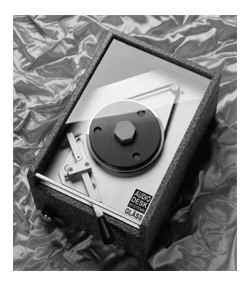Now you're really going to think I've lost it. This really does follow on well from my attempt to justify why higher quality cables "can" make a difference.
Just received one of these:


In short, it's a lathe for CDs. I get the impression that the logic is that CDs are not that well pressed, and the result is that many are unbalanced, a little like a car tyre. Spin it at 500rpm, and you get wobble (as you would through a steering wheel). The more wobble you get, the harder the error correction and CD laser has to work, and the worse it sounds.
Well that's the theory.
In practice, takes about a min to lathe a CD and apply black ink to the edge, so at least it's fast and easy.
As for the actual difference, frankly it's hard to believe. Really does reduce general hash and grunge from the mix, resulting in improving dynamic range, and thus how obvious the musicians are. The implications are that it simply sounds like the band are that much closer to being in your room. I can't say I'd recommend it for use with kit from RS, but for those with fairly expensive kit, and where improvements are getting substantially more expensive, it's money well spent.
I'm told that it works with any disk based format, including DVD, so I'll be trying that sometime in the near future.
It's OK guys, send the boys with the straight jackets around later on....
Just received one of these:


In short, it's a lathe for CDs. I get the impression that the logic is that CDs are not that well pressed, and the result is that many are unbalanced, a little like a car tyre. Spin it at 500rpm, and you get wobble (as you would through a steering wheel). The more wobble you get, the harder the error correction and CD laser has to work, and the worse it sounds.
Well that's the theory.
In practice, takes about a min to lathe a CD and apply black ink to the edge, so at least it's fast and easy.
As for the actual difference, frankly it's hard to believe. Really does reduce general hash and grunge from the mix, resulting in improving dynamic range, and thus how obvious the musicians are. The implications are that it simply sounds like the band are that much closer to being in your room. I can't say I'd recommend it for use with kit from RS, but for those with fairly expensive kit, and where improvements are getting substantially more expensive, it's money well spent.
I'm told that it works with any disk based format, including DVD, so I'll be trying that sometime in the near future.
It's OK guys, send the boys with the straight jackets around later on....
Last edited:






